Marfan Syndrome Treatment Cost In India
Unlock Exclusive Discount : Your Gateway to Premium Healthcare with Medsurge India Health Value Card.

Unlock Exclusive Discount : Your Gateway to Premium Healthcare with Medsurge India Health Value Card.

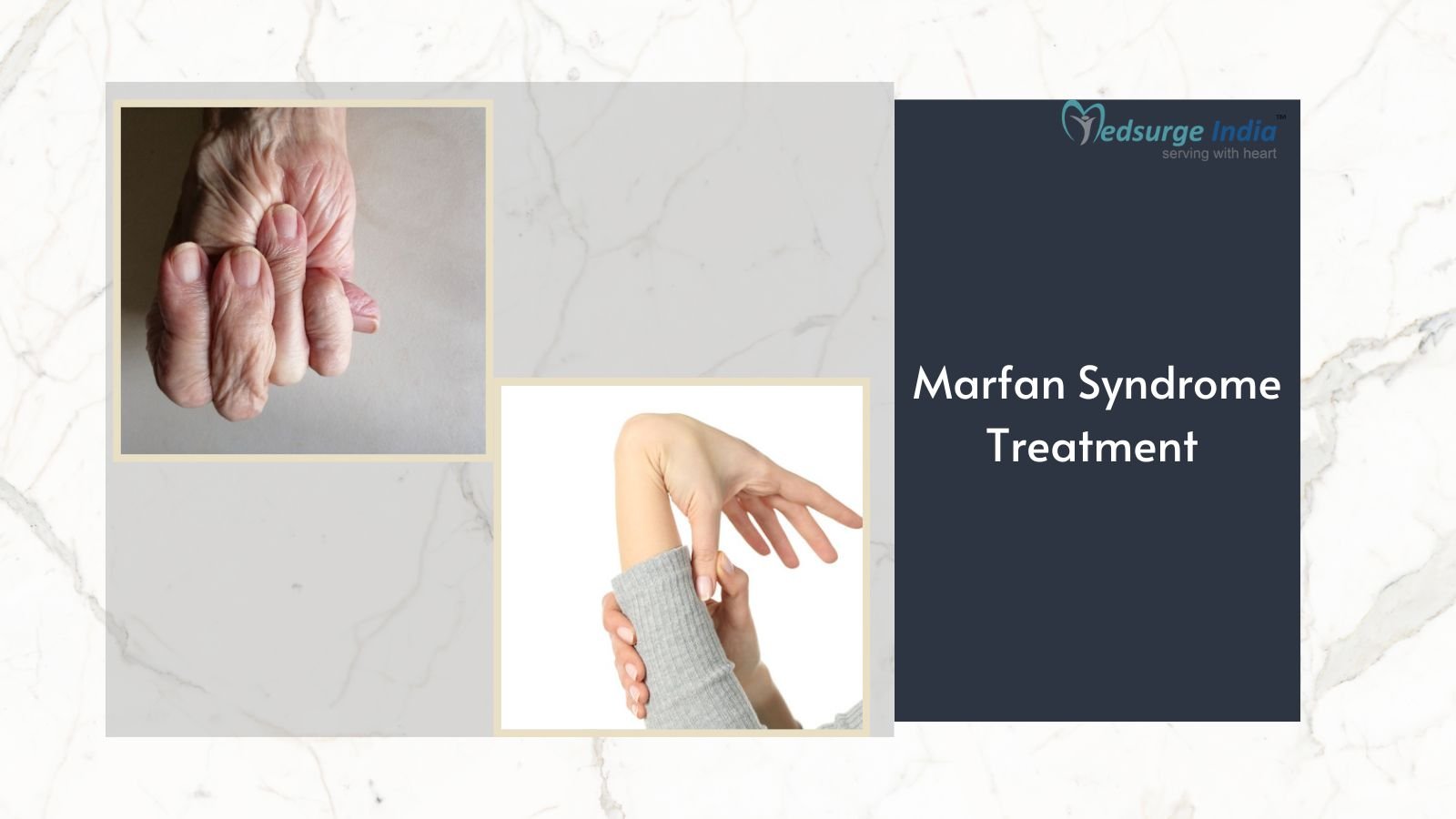
Marfan syndrome is an inherited disorder that affects connective tissue, which is made up of fibers that support and anchor your organs and other body structures. The heart, eyes, blood vessels, and skeleton are the most commonly affected organs in Marfan syndrome. Marfan Syndrome Treatment in India usually includes medications to keep your blood pressure low to reduce the strain on your aorta. It is critical to monitor damage progression on a regular basis. Many people with Marfan syndrome eventually require aortic repair surgery. The Marfan Syndrome Treatment Cost in India is reasonable when compared to other developed nations. The success may be partly credited to the oncologist and the surgeons’ expertise and the cutting-edge medical technology utilized in the best Indian facilities. In addition to these benefits, India is quite popular due to its inexpensive costs without reducing clinical standards.
Marfan syndrome is a connective tissue disorder. Connective tissue holds your body together and supports many structures throughout your body. The connective tissue in Marfan syndrome is abnormal. As a result, your heart and blood vessels, bones, tendons, cartilage, eyes, skin, and lungs are all affected. Marfan syndrome patients are typically tall and thin, with unusually long arms, legs, fingers, and toes. Marfan syndrome can cause mild or severe damage. If your aorta — the large blood vessel that connects your heart to the rest of your body — is damaged, the condition can be fatal.
Marfan Syndrome treatment Cost in India starts from INR 1,91,000 (2,300 USD). In comparison to other countries, the cost of Marfan Syndrome treatment in India is very low. Furthermore, the quality and standard of medical care and services are comparable to the best hospitals in the world.
The cost of a medical package in India may vary depending on several factors such as the type of treatment, the technique used, the choice of hospital and city, the doctor’s experience, and many more. This is the primary reason why thousands of patients from all over the world choose to travel to India for medical treatment.
Because the disorder can affect so many different areas of the body, the signs and symptoms of Marfan syndrome can vary greatly, even among members of the same family. Some people only have minor side effects, while others develop potentially fatal complications.
Symptoms of Marfan syndrome may include:
Because Marfan syndrome affects connective tissue, it can have a wide-ranging impact on your body, including your skeletal system, heart and blood vessels, eyes, skin, and organs:
Consult your doctor or pediatrician if you suspect you or your child has Marfan syndrome. If your doctor suspects a problem, you will most likely be referred to a specialist for further assessment.
Marfan syndrome is caused by a mutation in the gene that codes for the structure of fibrillin and elastic fibers, both of which are important components of connective tissue. This gene is known as fibrillin-1 (FBN1).
Marfan syndrome is usually inherited. The pattern is known as “autosomal dominant,” which means it affects both men and women equally and can be inherited from only one parent who has Marfan syndrome. Marfan syndrome patients have a 50% chance of passing the disorder on to their children.
A new gene defect occurs in 25% of cases due to an unknown cause. Marfan syndrome is also known as a “variable expression” genetic disorder because not everyone with Marfan syndrome has the same symptoms, and some people’s symptoms are worse than others.
Marfan syndrome manifests itself at birth. You may not be diagnosed until you are a teenager or young adult.
Because Marfan syndrome can affect tissue throughout your body, confirming the diagnosis and developing a treatment plan may require the involvement of a team of healthcare providers. First, they’ll take your medical history, perform a physical exam to look for typical Marfan syndrome signs or findings, ask you questions about your symptoms, and gather information about family members who may have had health problems related to Marfan syndrome.
The following tests may be used to evaluate changes in the heart, blood vessels, and heart rhythm problems or to directly diagnose Marfan’s syndrome:
If your healthcare provider cannot see sections of the aorta on an echocardiogram or suspects a dissection has already occurred, you may require additional testing.
These includes:
A blood test can aid in the diagnosis of Marfan syndrome. This genetic test looks for changes in FBN1, the gene responsible for the majority of Marfan syndrome cases.
Because FBN1 test results are not always obvious, you should consult with a genetic counselor. Blood tests can also be used to help diagnose other genetic mutations that cause physical symptoms similar to Marfan syndrome, such as Loeys-Dietz syndrome.
While there is no exact cure for the condition, treatment for Marfan's Syndrome in India focuses on preventing the disease's various complications. To do so, you'll need to be checked on a regular basis for signs that the disease's damage is progressing. People with Marfan syndrome used to die at a young age. Most people with Marfan syndrome can now expect to live a more normal life with regular monitoring and modern treatment.
Blood pressure medications are frequently prescribed by doctors to help prevent the aorta from enlarging and to reduce the risk of dissection and rupture.
The vision problems caused by a dislocated lens in your eye are frequently correctable with glasses or contact lenses.
Surgery and other processes:
If you require surgery, pick a large health system that has expertise in doing this kind of operation. People are seeing better outcomes thanks to improved knowledge of Marfan syndrome, early discovery, diligent follow-up, and safer surgical methods.
The issues that Marfan syndrome produces in other areas of your body may require medical attention. You can get assistance with issues with your eyes, lungs, or bones from medical professionals who focus on particular conditions.
Indian Marfan Syndrome treatment hospitals are well-known for their hospitality and patient care services. The best cardiologist, general surgeons, Ophthalmologists, Orthopaedists, etc in India at these hospitals are specialists in their fields. However, choosing a suitable hospital for treatment can be difficult for an international patient. It is a significant decision that must be made with several factors in mind, including:
Medsurge India is a prestigious support system for patients looking for doctors, hospitals, and specialized treatments. We'll find the most suitable medical options for you. Regarding your medical issues, our team will give you a list of certified, reputable, and trusted doctors and hospitals. Additionally, we offer a treatment strategy that fits your budget. Apart, we assist patients with obtaining travel authorizations, medical visas, and a multitude of other things.
A1: Additionally, the faulty fibrillin gene results in certain bones growing longer than they ought to. Thus, a person with Marfan syndrome may be tall due to the fact that their arms and legs develop more slowly than usual.
A2: Even if you don't have any symptoms, genetic testing employs blood tests to find abnormalities in the FBN1 genes. There is currently no blood test that can accurately identify Marfan syndrome due to the wide variety of mutations that can occur in the FBN1 gene.
A3: Due to the proliferation of the long bones, people with Marfan syndrome frequently exhibit distinctive physical characteristics, such as an unusually thin physique and excessively long, slender arms and legs (dolichostenomelia).
A4: The most frequent and avoidable cause of sudden cardiac mortality among athletes is Marfan syndrome. It is a connective tissue condition that affects numerous organ systems and is autosomal dominant. The most frequent cause of sudden death is the rupture or dissection of an aortic root aneurysm.
A5: Each kid of a parent with Marfan syndrome has a 50% probability (1 chance in 2) of inheriting the FBN1 gene. It is usually heritable, even if Marfan syndrome is not always inherited.

General Surgeon
Senior Consultant
12 years
Care Hospital, Banjara Hills, Hyderabad
View Doctor
General Surgeon
Associate Consultant
3+ years
Care Hospital, Banjara Hills, Hyderabad
View Doctor
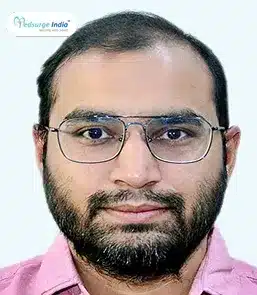

General Surgeon, Laparoscopic Surgeon
Consultant
11+ years
N/A
View Doctor
General Surgeon, Laparoscopic Surgeon
Senior Consultant
32+ years
N/A
View Doctor
General Surgeon, Laparoscopic Surgeon
Consultant
15+ years
Akropolis Super Speciality Hospital
View Doctor


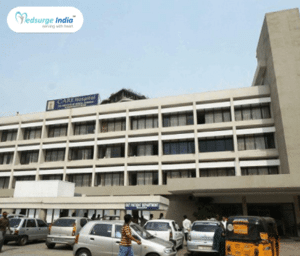


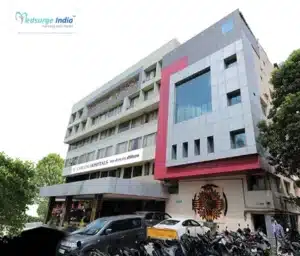



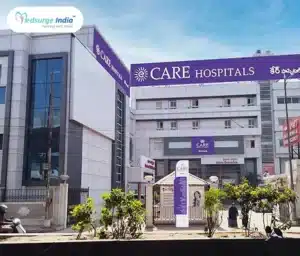


By using our site, you agree to our Terms and Conditions, Privacy Policy and Refund Policy. Medsurgeindia does not provide medical advice, diagnosis, or treatment. The information provided on this site is designed to support, not replace, the relationship that exists between a patient/site visitor and his/her existing physician. We also Accept International Payments.

Copyright © 2025 NSM ONLINE SOLUTIONS PRIVATE LIMITED. All rights reserved.